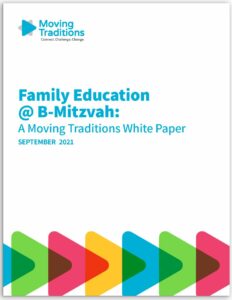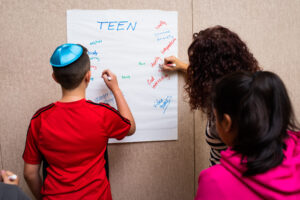Moving Traditions Family Education @ B-Mitzvah Offers Meaningful New Engagement
September 24th, 2021
Adolescence can be a fraught stage of life for many families, and even more so now. The opportunity is ripe for a new timeframe and approach to Jewish family education. To strengthen Jewish families and Jewish life, family education in the preteen years needs to become as normalized as family education for preschoolers.
– Deborah S. Meyer, Moving Traditions Founder and CEO
Preteens—and by extension, their parents—face unique challenges and opportunities today from omnipresent technology and new ideas about gender, sexuality, race, and other layers of identity. To help meet the changing needs of Jewish preteens and parents, Moving Traditions invites the Jewish community to embrace a new approach for family education through its new white paper, Family Education @ B-Mitzvah. This endeavor builds on Moving Traditions’ efforts to inspire Jewish youth of all genders to pursue personal wholeness, healthy relationships, and a just and inclusive world
During the pandemic more parents participated in Jewish education with their preteens and many of them have asked me to continue to do family education this way in the coming year.
– Rabbi Matt Shapiro, Los Angeles
 The B-Mitzvah Family Education Program is based on a SEL-model of Jewish family education that balances preteen self-reflection and peer discussion with parent-child explorations of family dynamics and Jewish ethics, both within private conversations and in a communal setting. Evaluation research found that, for program participants:
The B-Mitzvah Family Education Program is based on a SEL-model of Jewish family education that balances preteen self-reflection and peer discussion with parent-child explorations of family dynamics and Jewish ethics, both within private conversations and in a communal setting. Evaluation research found that, for program participants:
1. Jewish wisdom speaks to families in this life stage:
Preteens and parents find relevance and meaning in experiences integrating Jewish teachings with secular wisdom on social-emotional learning and human development.
2. Hevruta can bring value to parents and children:
Preteens and parents value the opportunity to be in meaningful dialogue with each other, drawing on Jewish and secular wisdom about issues of concern to them at this new stage of life, as children become teens.
3. Jewish community can be experienced by families as relevant and meaningful:
By effectively addressing the joys and challenges of preteens and parents, clergy and Jewish educators demonstrate to families that Jewish community is a place for support and connection.
Moving Traditions was created with the understanding that Jewish people and practice will thrive as Judaism continues to evolve—as it always has—to meet the changing needs of Jewish people. Since the B-Mitzvah Program was initially launched, Moving Tradition has touched the lives of 13,409 preteen and parents.
It was nice having something that gave preteens and parents an opportunity to think about what it means to be a part of the Jewish community, particularly when everything has been virtual.
– Parent
Family Education @ B-Mitzvah shares key findings from the pilot phase of Moving Traditions B-Mitzvah Family Education program in partnership with 110 organizational partners, and includes a call to action informed by Moving Traditions’ recent convening of 50 leading scholars, Jewish educators, activists, and funders. Moving Traditions has adopted the term “b-mitzvah” in place of “b’nai mitzvah” in recognition of trends in gender fluidity. With these findings, and after more than 17 months of the pandemic, Moving Traditions feels even more urgency to develop this new frame of Jewish family education for preteen families.
partnership with 110 organizational partners, and includes a call to action informed by Moving Traditions’ recent convening of 50 leading scholars, Jewish educators, activists, and funders. Moving Traditions has adopted the term “b-mitzvah” in place of “b’nai mitzvah” in recognition of trends in gender fluidity. With these findings, and after more than 17 months of the pandemic, Moving Traditions feels even more urgency to develop this new frame of Jewish family education for preteen families.
Please join Moving Traditions and a growing community of academics, educators, activists, and funders in developing this new framework of preteen Jewish family education. Together we will create Jewish experiences where preteens and their families can learn, explore, and feel more connected to each other, and to Jewish life.
As with the organization’s Teen Groups, the B-Mitzvah Program is implemented mostly in partnership with synagogues and other organizations, and the curriculum reflects their input and creativity. View Family Education @ B-Mitzvah.
The Jim Joseph Foundation is a supporter of Moving Traditions